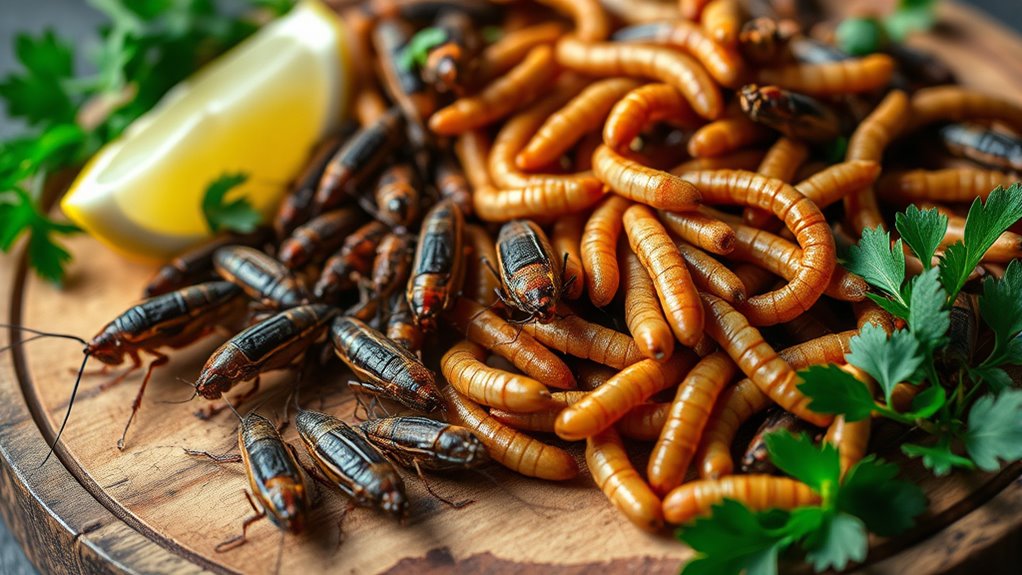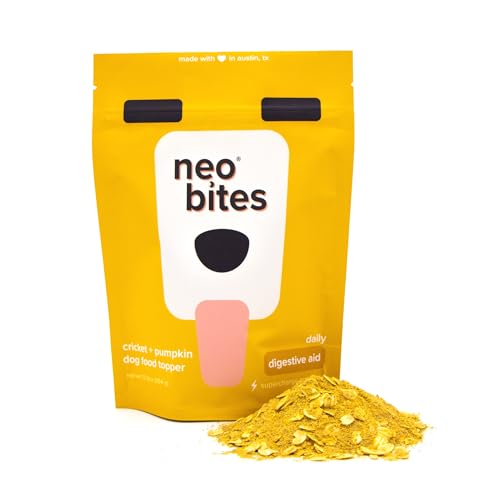Edible insects are emerging as a sustainable and nutrient-rich protein source that can help address global food security. They require fewer resources like land, water, and feed compared to traditional livestock, making them eco-friendly. Rich in high-quality protein, healthy fats, vitamins, and minerals, insects like crickets can easily be incorporated into your diet through snacks or powders. To discover how insects could revolutionize future food systems and benefit the environment, keep exploring this innovative solution.
Key Takeaways
- Edible insects provide a high-quality, sustainable protein source with a lower environmental footprint than traditional livestock.
- Insect farming requires minimal land, water, and feed, making it ideal for resource-constrained environments.
- They are rich in essential nutrients, including protein, healthy fats, vitamins, and minerals.
- Insects can be integrated into existing food systems, supporting global food security and waste reduction.
- Their scalability and eco-friendly profile make insects a promising future solution for protein needs worldwide.

Have you ever considered insects as a sustainable food source? It’s a concept that’s gaining traction as the world faces increasing challenges to feed a growing population. Insects are not only abundant and easy to farm, but they also play a *crucial* role in sustainable farming practices. Unlike traditional livestock, which require vast amounts of land, water, and feed, insects can be raised efficiently with minimal resources. They thrive on organic waste and need *considerably* less space, making them an environmentally friendly alternative. This scalability makes insect farming an attractive option for those aiming to reduce ecological footprints while producing nutritious food.
Insects are a sustainable, resource-efficient food source supporting eco-friendly farming and global food security.
When you look at insect nutrition, it becomes clear why insects are considered a viable protein source. They are packed with high-quality protein, essential amino acids, healthy fats, vitamins, and minerals. For example, crickets contain around 65% protein by dry weight, comparable to or even surpassing some conventional meats. These tiny creatures are also rich in omega-3 and omega-6 fatty acids, contributing to a balanced diet. Their nutritional profile makes insects a complete food source that can meet the dietary needs of diverse populations. *furthermore*, insects are easily digestible, and their consumption can complement plant-based diets by providing essential nutrients that might be harder to obtain from vegetables alone.
Incorporating insects into the global food system could be a game-changer. Their cultivation supports sustainable farming because they require less land, water, and feed compared to traditional livestock. This means less deforestation and lower greenhouse gas emissions, helping combat climate change. Additionally, insect farming can be integrated into existing agricultural systems, utilizing organic waste streams that would otherwise go to waste. This creates a circular economy where waste becomes a resource, *delineating* environmental impact.
As you explore more about edible insects, you’ll find that the benefits extend beyond environmental sustainability. They’re also a practical solution for food security, especially in regions where resources are scarce or where traditional farming is challenging. The versatility of insects as food allows for a variety of culinary uses, from protein powders to snack foods. By embracing insect nutrition as part of sustainable farming practices, you contribute to a future where food production is more efficient, eco-friendly, and capable of nourishing a growing world population. It’s a simple yet powerful shift that aligns with global efforts to create a resilient, sustainable food system for generations to come.

ecoEat Cricket Flour Powder Protein – 100g – Healthy Powder Edible Insect Powder
High in protein, nearly 70% protein!
As an affiliate, we earn on qualifying purchases.
As an affiliate, we earn on qualifying purchases.
Frequently Asked Questions
Are Edible Insects Safe for People With Shellfish Allergies?
If you have shellfish allergies, edible insects may pose allergy concerns due to shellfish cross-reactivity. You should be cautious because insects like crickets and mealworms contain proteins similar to shellfish, which can trigger allergic reactions. It’s best to consult your healthcare provider before trying edible insects, especially if you have a history of shellfish allergies. When in doubt, avoid them to prevent any adverse reactions.
How Do Insects Compare to Traditional Livestock in Nutritional Value?
You’ll find that insects often have a higher protein density than traditional livestock, making them an efficient protein source. Their amino acid profile is comparable to that of meat, providing essential building blocks your body needs. Plus, insects usually require less feed, water, and land to produce, making them a more sustainable choice. Overall, incorporating insects into your diet can boost nutritional value while helping reduce environmental impact.
What Are the Environmental Impacts of Farming Edible Insects?
You’ll love how farming edible insects slashes environmental impacts—it’s practically a superhero of sustainable farming! They require far less land, water, and feed than traditional livestock, dramatically reducing waste. Plus, insects thrive on organic waste, turning what would be trash into tasty protein. So, by choosing edible insects, you’re not just munching; you’re actively reducing waste and shrinking your carbon footprint—talk about a deliciously responsible choice!
How Culturally Accepted Are Edible Insects Worldwide?
Cultural acceptance of edible insects varies widely around the world. In some regions, like parts of Asia, Africa, and Latin America, regional perceptions are favorable, and eating insects is common. However, in Western countries, many people see insects as unusual or unappealing, limiting their acceptance. Your willingness to try insects depends heavily on cultural background and exposure, with growing interest in sustainable foods slowly changing perceptions globally.
What Regulations Govern the Sale of Edible Insect Products?
You need to follow regulatory standards and labeling requirements when selling edible insect products. These rules ensure safety and transparency, often set by government agencies like the FDA or EFSA. You must clearly label ingredients, nutritional info, and allergen warnings. Compliance varies by country, so it’s vital to stay updated on local laws to avoid penalties and build consumer trust. Always check current regulations before marketing your edible insect products.

Don Bugito Planet-Friendly Edible Insect Protein Snacks (Dark Chocolate Covered Crickets)
Don Bugito, the Prehispanic Snackeria, is a San Francisco based company focused on planet-friendly protein snacks, featuring delicious…
As an affiliate, we earn on qualifying purchases.
As an affiliate, we earn on qualifying purchases.
Conclusion
So, consider insects as a sustainable, nutritious, and innovative protein source. Think of them as a solution to feed the growing world, a way to reduce environmental impact, and a chance to diversify your diet. Embrace the idea of edible insects not just as food, but as a smart choice for a healthier planet and a healthier you. Because, when you choose insects, you’re choosing a future that’s sustainable, efficient, and full of potential.

Neo Bites Dog Food Topper, Cricket Protein Supplement, Vegan & Vegetarian Alternative, Insect Based, Probiotics, Superfood, Natural Meal Mixer, Gut Health, 45 Day Supply 12.5 oz Digestive Aid
WHOLE-FOOD INGREDIENTS: Made with only 6 superfood ingredients including pumpkin, oats, ginger, apple, and cricket protein. All locally…
As an affiliate, we earn on qualifying purchases.
As an affiliate, we earn on qualifying purchases.

Erbies Edible Bug Mixed Trail Mix, 15g Bag, Seasoned and Crunchy Insects, Crickets, Grasshoppers, Silkworm Pupae, and Sago Worms, Protein Packed Unique Snacks, Fun Snacks Gift Idea, 1-Pack
Mixed Trail Mix Edible Insects – This edible insects bag of mixed edible dried bugs comes with a…
As an affiliate, we earn on qualifying purchases.
As an affiliate, we earn on qualifying purchases.









